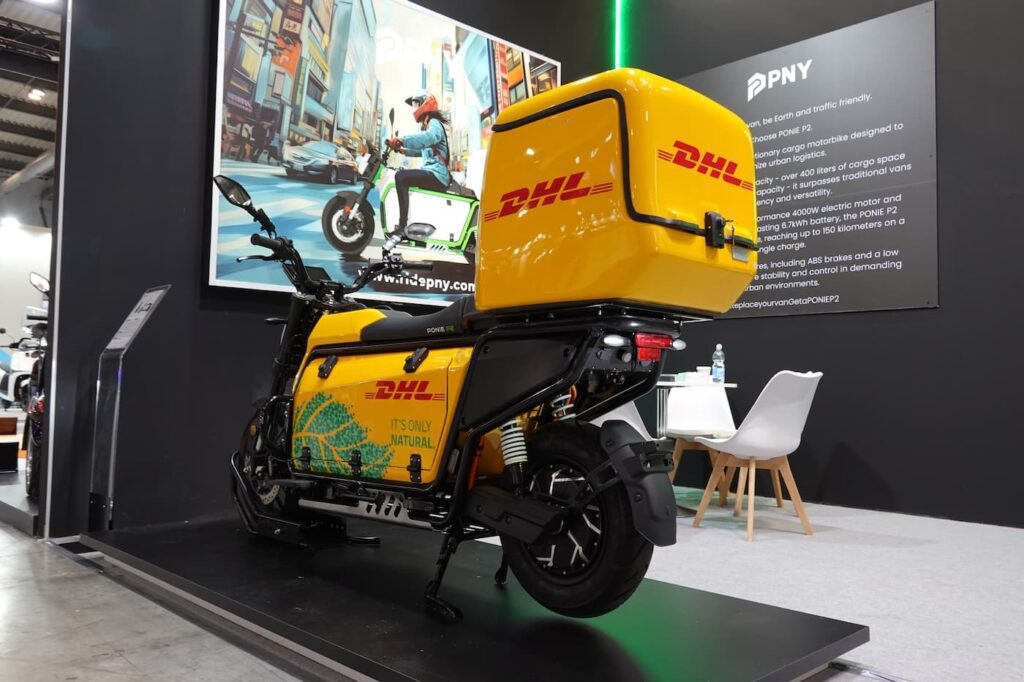The world of urban logistics is on the brink of transformation, and PNY’s new electric cargo motorcycle, the Ponie P2, is leading the charge. Designed as a sustainable alternative to traditional delivery vans, the Ponie P2 combines speed, efficiency, and a substantial cargo capacity, making it an ideal solution for last-mile deliveries in densely populated areas. As companies like DHL and local postal services initiate pilot programs to test this innovative vehicle, the Ponie P2 stands out as a promising model for the future of green urban logistics.
The adoption of the Ponie P2 marks a pivotal moment in the shift toward electrified, eco-friendly transportation in the delivery sector. With urban areas facing challenges like rising traffic congestion, air pollution, and demand for quick, reliable deliveries, the introduction of a vehicle that prioritizes both efficiency and environmental responsibility couldn’t come at a better time. Here’s an in-depth look at the features, performance, and impact of the Ponie P2 as it hits the road.
PNY’s Ponie P2 is engineered to be a powerful and versatile tool for urban deliveries. This electric cargo motorcycle sports a 4,000-watt rear hub motor, allowing it to reach a top speed of 100 km/h (62 mph). With a 6.7 kWh CATL battery, the Ponie P2 offers a range of up to 150 km (93 miles) on a single charge, making it suitable for a full day of urban deliveries without the need for frequent recharging. This is an essential feature for logistics companies that operate on tight schedules and rely on reliable, efficient vehicles.
Beyond speed and range, the Ponie P2 is designed with cargo in mind. The motorcycle’s cargo area offers 400 liters (about 14 cubic feet) of storage space, with a load capacity of up to 120 kg (265 lbs). This impressive capacity enables the Ponie P2 to carry a significant amount of parcels, reducing the number of trips required for each route and ultimately improving delivery efficiency. The low center of gravity, created by thoughtful weight distribution, enhances the motorcycle’s stability, even when fully loaded.
A 7-inch color display, compatible with Apple CarPlay, provides the driver with real-time data on navigation, battery levels, and performance, allowing for a streamlined, tech-enabled experience. Safety features, such as ABS brakes, ensure that the motorcycle maintains control even under sudden braking conditions, essential for navigating urban streets where obstacles and pedestrians are frequent.
To evaluate the Ponie P2’s performance and suitability for large-scale deployment, PNY has partnered with major logistics companies, including DHL and local postal services, in pilot programs. These connects are more than just a test run; they’re a trial to determine if the Ponie P2 can effectively replace traditional delivery vans for certain routes, especially in busy urban centers where maneuverability and emissions reduction are critical.
DHL’s adoption of the Ponie P2 for pilot testing signifies the logistics industry’s shift toward electrified fleets. By integrating electric cargo motorcycles, logistics companies can address several key challenges: reducing carbon emissions, lowering operational costs, and minimizing urban congestion. The pilot programs will focus on assessing the Ponie P2’s handling in different weather conditions, efficiency on tight schedules, and adaptability in real-world urban settings, where space and agility are essential.
These trials will help DHL and other logistics companies collect valuable data on how well the Ponie P2 meets delivery demands and how it compares to traditional vehicles in terms of maintenance, fuel costs, and environmental impact. Should the Ponie P2 prove successful in these scenarios, it could pave the way for widespread adoption of similar vehicles across the logistics industry.
Cities worldwide face mounting issues related to congestion, noise, and air pollution. Traditional delivery vans contribute significantly to these problems, emitting carbon dioxide and taking up precious road space in already crowded streets. By contrast, electric cargo motorcycles like the Ponie P2 present a cleaner, quieter alternative that aligns with urban sustainability goals.
Electric motorcycles produce zero tailpipe emissions, reducing their environmental footprint and supporting cleaner air in densely populated areas. The Ponie P2’s compact design enables it to maneuver through traffic more efficiently than a van, reducing the time spent idling and potentially lessening overall traffic congestion. The move toward electric motorcycles in the logistics sector could lead to significant reductions in both carbon emissions and noise pollution in cities.
Moreover, the Ponie P2 supports the broader vision of green mobility in urban centers. Many cities are increasingly encouraging eco-friendly transportation methods and are developing infrastructure to support them. The Ponie P2 is ideally suited for this shift, offering a balance of functionality and environmental responsibility that could help cities achieve their sustainability targets.
The last mile—the final leg of the delivery journey from a hub to the customer’s doorstep—is often the most challenging and costly part of logistics operations. This stage of delivery requires vehicles that are agile, efficient, and cost-effective, especially in urban areas where parking is limited, and traffic is heavy. The Ponie P2’s design addresses these needs, positioning it as an ideal solution for last-mile delivery.
By carrying a significant payload in a smaller, more maneuverable vehicle, the Ponie P2 enables logistics companies to complete deliveries faster and with greater fuel efficiency. Its extended range of up to 150 km per charge allows it to cover extensive urban routes without needing to return for recharging, further optimizing delivery schedules. With its cargo capacity and minimal spatial footprint, the Ponie P2 is well-suited for navigating urban environments, making multiple stops without struggling with parking limitations.
The introduction of the Ponie P2 into logistics fleets marks a significant step in the industry’s journey toward electrification. In recent years, major players in the sector have committed to achieving carbon neutrality and investing in sustainable technologies. The adoption of electric cargo motorcycles like the Ponie P2 reinforces this commitment, setting a new standard for green logistics solutions.
By prioritizing efficiency and environmental responsibility, PNY is demonstrating how electric vehicles can contribute to reshaping the logistics landscape. The Ponie P2 showcases the potential for electric cargo motorcycles to become viable alternatives to traditional vans, especially in urban areas where quick, clean, and efficient delivery solutions are in high demand. As cities impose stricter emissions regulations, the demand for electric delivery vehicles will only increase, making PNY’s Ponie P2 an important model for the future.
While the Ponie P2 offers many advantages, there are some challenges to consider for its widespread adoption. The upfront cost of electric vehicles, including cargo motorcycles, can be higher than that of traditional vehicles due to the expense of battery technology. Logistics companies may need to balance the initial investment with the long-term savings from reduced fuel and maintenance costs.
Infrastructure also poses a challenge. Electric vehicles require reliable charging stations, and urban areas may need to expand their infrastructure to support a growing fleet of electric delivery vehicles. Battery charging times, though improving, may also limit the motorcycle’s ability to operate continuously without planned breaks for recharging.
The Ponie P2 electric cargo motorcycle is more than just a new vehicle; it’s a symbol of the logistics industry’s commitment to innovation and sustainability. As DHL and other logistics giants pilot this vehicle, they’re helping to drive a transformation that could reshape urban delivery, making it cleaner, quieter, and more efficient. The Ponie P2’s adoption highlights the potential for electric motorcycles to become integral components of urban logistics, addressing some of the most pressing challenges faced by cities today.
The pilot programs, connects with logistics companies, and real-world testing will reveal the Ponie P2’s capabilities in various scenarios, laying the groundwork for electric motorcycles to replace traditional delivery vans in urban centers. With benefits like reduced emissions, ease of maneuverability, and improved last-mile delivery efficiency, the Ponie P2 stands out as a model for the future.
As cities grow and sustainability becomes a priority, the Ponie P2 and similar electric cargo motorcycles will play a vital role in transforming logistics operations. PNY’s innovative approach to addressing environmental and logistical challenges makes the Ponie P2 a noteworthy addition to the electric vehicle market, underscoring the potential of sustainable technology in shaping the future of urban mobility.
No comments yet.








